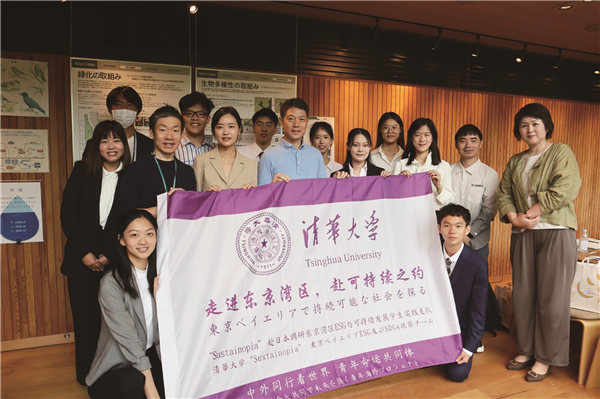A trip to Japan to learn green business experience


"Is there a paradox between corporate sustainability and financial prosperity?" This was a question I asked while meeting with representatives of the Kikkoman Corporation, a leading Japanese food company, and it sparked an interesting conversation.
In recent years, the global emphasis on sustainable development and the pursuit of carbon neutrality have underscored the importance of the factors behind ESG (environmental, social, and governance) investing. These three critical factors assess a company's sustainability and societal impact.
As the spotlight on ESG intensifies, many have become intrigued by its influence on a company's profitability, especially regarding its dedication to green development.
Addressing this public intrigue, Tsinghua University's "Sustainopia" overseas practice team, led by myself and comprised of 11 students with diverse backgrounds from China, Japan and Indonesia, set forth on a research expedition to the Tokyo Bay Area in Japan late last month.
Over nine days, we engaged with six major Japanese corporations, aiming to decode Japan's ESG and sustainable development approach. Our ultimate goal was to gain insights that could be applied within a Chinese context.
The first port of call was the century-old Kikkoman Corporation, which is famous for its food products. The corporate representatives emphasized the importance of recognizing "business opportunities that align with the goal of carbon neutrality" while discussing the equilibrium between company profitability and green development.
The sustainable practices at Kikkoman deeply impressed Rio, a Japanese member of our team. She admired the ingenuity of the low-sodium soy sauce production and the creative use of by-products to craft staff business cards, transforming waste into a valuable resource.
"Kikkoman has blended the pursuit of sustainability into its manufacturing processes, daily routines and overall business ethos. I believe that this is a significant lesson for Chinese businesses," she said.
On the other hand, freshman Hong Xinyue found her visit to the insurance giant Mitsui Sumitomo profoundly informative. She discovered that climate change-related disasters have led to an eightfold surge in client claims, indicating the huge impact they have had on insurance companies.
Hong distilled two key lessons from Mitsui Sumitomo's practices for Chinese enterprises. First, the company's proactive search for business growth opportunities aligns with the decarbonization trend. This includes an expansion into green insurance services that offer risk coverage and financial support for green governance, operations and consumption. Second, Mitsui Sumitomo is reshaping its traditional business model to provide pre- and post-disaster consultancy services, thereby transcending its conventional insurance functions.
The impressive integration of environmental sustainability into Mitsui Sumitomo's business strategy can be clearly seen from their office design. Visitors are greeted by a bright, pristine reception, staircases are graced with lush greenery, and a rooftop garden flourishes, offering an urban farming space for people. These features apparently manifest a corporate vision intertwined with sustainability, exuding vitality in the midst of urban bustle.
Through these visits, I've come to realize that company profitability and green development are not mutually exclusive. In the era of green transformation, companies worldwide must capitalize on their initiatives, boost their competitiveness in the green and low-carbon market via technological innovation and governmental support, while fulfilling their societal obligations. This approach can unlock greater commercial value for enterprises.
The diversity of industries we encountered provided us a rich, multifaceted understanding of the latest trends in ESG and sustainable development.
The time-tested business philosophy of the Kikkoman Corporation resonated deeply with our team: "Those that are prepared to flow with the times shall prosper; ruin awaits those who do not." In the current context of sustainable development, this rings particularly true — success awaits those who adapt to emerging trends, while adversity is in store for those who resist.
Written by Han Shuyuan, a junior student at the Department of Humanities, Tsinghua University, Beijing.




































